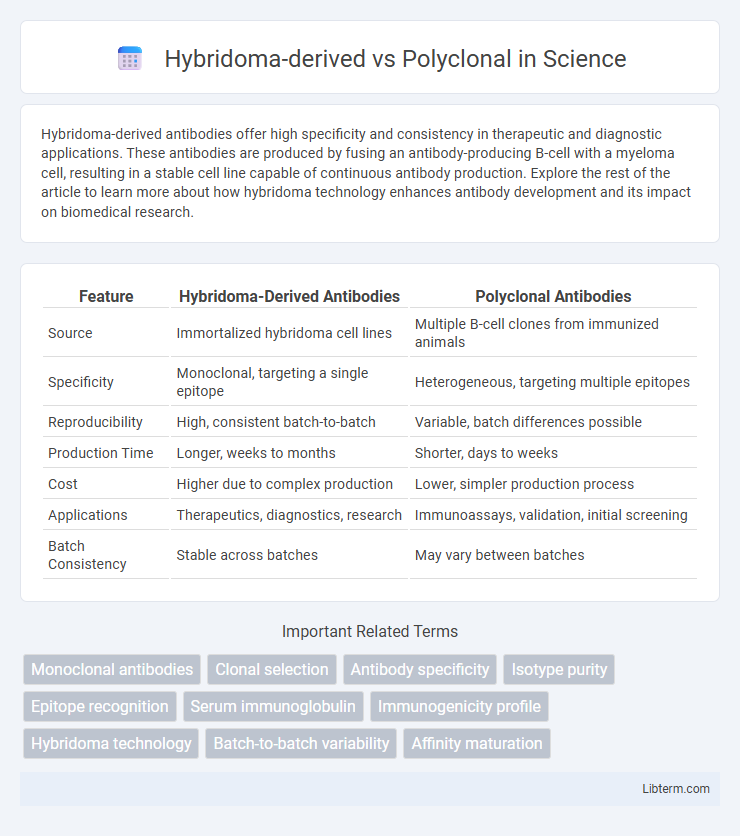Hybridoma-derived antibodies offer high specificity and consistency in therapeutic and diagnostic applications. These antibodies are produced by fusing an antibody-producing B-cell with a myeloma cell, resulting in a stable cell line capable of continuous antibody production. Explore the rest of the article to learn more about how hybridoma technology enhances antibody development and its impact on biomedical research.
Table of Comparison
| Feature | Hybridoma-Derived Antibodies | Polyclonal Antibodies |
|---|---|---|
| Source | Immortalized hybridoma cell lines | Multiple B-cell clones from immunized animals |
| Specificity | Monoclonal, targeting a single epitope | Heterogeneous, targeting multiple epitopes |
| Reproducibility | High, consistent batch-to-batch | Variable, batch differences possible |
| Production Time | Longer, weeks to months | Shorter, days to weeks |
| Cost | Higher due to complex production | Lower, simpler production process |
| Applications | Therapeutics, diagnostics, research | Immunoassays, validation, initial screening |
| Batch Consistency | Stable across batches | May vary between batches |
Introduction to Hybridoma-Derived and Polyclonal Antibodies
Hybridoma-derived antibodies are produced by fusing a specific B-cell with a myeloma cell, creating a continuous cell line that secretes a uniform monoclonal antibody targeting a single epitope. Polyclonal antibodies are generated by immunizing animals, resulting in a heterogeneous mix of antibodies that recognize multiple epitopes on the same antigen. Hybridoma antibodies provide high specificity and reproducibility, while polyclonal antibodies offer greater sensitivity due to their diverse antigen recognition.
Definition and Production Methods
Hybridoma-derived antibodies are produced by fusing specific antibody-producing B cells with myeloma cells, resulting in a single clone that produces monoclonal antibodies with consistent specificity and affinity. Polyclonal antibodies are generated by immunizing an animal, such as a rabbit or goat, and collecting the heterogeneous mixture of antibodies produced by multiple B cell clones targeting various epitopes on the antigen. Hybridoma technology enables large-scale, reproducible production of monoclonal antibodies, whereas polyclonal antibody production relies on animal serum harvesting and yields variable affinity and batch-to-batch heterogeneity.
Key Differences in Antibody Specificity
Hybridoma-derived antibodies, also known as monoclonal antibodies, originate from a single B-cell clone, resulting in high specificity for a single epitope on an antigen, ensuring consistent and reproducible binding. Polyclonal antibodies are produced from multiple B-cell clones, recognizing multiple epitopes on the same antigen, which increases sensitivity but reduces specificity. The key difference in antibody specificity lies in monoclonal antibodies' precise targeting of a single epitope versus polyclonal antibodies' broader epitope recognition, impacting applications like diagnostic accuracy and therapeutic targeting.
Purity and Consistency Comparison
Hybridoma-derived antibodies exhibit high purity and exceptional batch-to-batch consistency due to their monoclonal nature, producing identical antibody molecules with specific antigen affinity. Polyclonal antibodies, generated from multiple B-cell clones, present variable purity and heterogeneity, leading to less consistent performance across different batches. The monoclonal characteristic of hybridoma-derived antibodies ensures reproducible experimental results critical for diagnostic and therapeutic applications.
Applications in Research and Diagnostics
Hybridoma-derived monoclonal antibodies provide high specificity and uniformity, making them ideal for precise quantification and identification of target proteins in diagnostic assays and standardized research applications. Polyclonal antibodies recognize multiple epitopes on an antigen, enhancing sensitivity and detection capabilities in applications such as immunoprecipitation, western blotting, and histology. The choice between hybridoma-derived and polyclonal antibodies depends on the required specificity, reproducibility, and target complexity in research and diagnostic workflows.
Batch-to-Batch Variability
Hybridoma-derived antibodies exhibit low batch-to-batch variability due to their monoclonal nature, ensuring consistent specificity and affinity across production batches. Polyclonal antibodies, sourced from multiple B-cell clones, often show higher variability in epitope recognition and binding strength between batches. This inconsistency in polyclonal antibodies can impact reproducibility in experiments and diagnostic assays.
Sensitivity and Cross-Reactivity
Hybridoma-derived antibodies exhibit high specificity and lower cross-reactivity due to their monoclonal origin, making them highly sensitive for detecting target antigens with minimal background noise. Polyclonal antibodies, produced from multiple B-cell clones, offer greater sensitivity in recognizing antigen variants but often have increased cross-reactivity due to their diverse epitope recognition. The choice between hybridoma-derived and polyclonal antibodies depends on the balance between desired sensitivity and acceptable levels of cross-reactivity in the experimental context.
Cost and Scalability Considerations
Hybridoma-derived antibodies offer higher scalability due to their ability to produce consistent monoclonal antibodies in large quantities, but initial costs for cell line development and maintenance can be substantial. Polyclonal antibodies are generally less expensive upfront and faster to produce, as they involve immunizing animals directly without the need for cell culture, yet batch-to-batch variability limits scalability for large-scale applications. Cost-effectiveness depends on the balance between the required antibody specificity, production volume, and long-term consistency needs in research or therapeutic contexts.
Advantages and Limitations of Each Type
Hybridoma-derived antibodies offer high specificity and consistent reproducibility due to their monoclonal nature, making them ideal for targeted diagnostics and therapeutics. Polyclonal antibodies provide robust antigen recognition and higher sensitivity by targeting multiple epitopes, but suffer from batch variability and potential cross-reactivity. The choice between hybridoma-derived and polyclonal antibodies depends on the required specificity, sensitivity, and consistency for the intended application.
Choosing the Right Antibody for Your Application
Hybridoma-derived monoclonal antibodies offer high specificity and batch-to-batch consistency, making them ideal for applications requiring precise target recognition such as diagnostic assays and therapeutic use. Polyclonal antibodies, derived from multiple immune cells, provide a stronger signal due to their ability to recognize multiple epitopes on an antigen, which is beneficial for detecting low-abundance proteins or in initial screening processes. Selecting the right antibody depends on the experimental requirements: monoclonal antibodies are preferable for specificity and reproducibility, while polyclonal antibodies excel in sensitivity and versatility.
Hybridoma-derived Infographic

 libterm.com
libterm.com